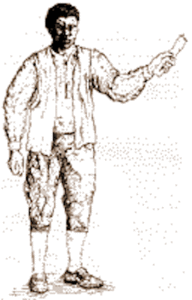
Thomas Peters
*The birth of Thomas Peters is celebrated on this date in 1738. He was a Black abolitionist and soldier fighting for the British in the American Revolutionary War.
He was born in West Africa to the Yoruba tribe, the Egba clan. In 1760, at twenty-two years old, he was captured by slave traders, sold as a slave, and transported to Colonial America on a French ship, the Henri Quatre. At this time, he became Thomas Peters. Upon arrival in North America, he was sold to a French planter in French Louisiana. Peters tried to escape three times before being sold to one of the Southern Colonies, an immigrant Scotsman who had settled on the Cape Fear River in Wilmington, North Carolina.
1776 Peters escaped from his master's flour mill at the start of the American Revolutionary War and migrated to New York. He joined the Black Pioneers, a Black British Loyalist unit made up of African refugee slaves in America. Peters was a sergeant in the regiment and twice wounded in battle. During this time, Thomas married Sally Peters, an enslaved refugee from South Carolina. They had a daughter called Clairy and a son, John. After the war, Peters, white Loyalists, and thousands of other formerly enslaved Africans were evacuated by the British and resettled in Nova Scotia.
The Crown allotted land and supplies to the pioneers to help with the first year. The Peters family resided here from 1783 to 1791. Peters became disheartened with broken promises of land, aid by the British government, and racism by whites in Nova Scotia. He gathered the signatures and marks of African settlers in Nova Scotia and New Brunswick before getting funds to travel to London to settle the blacks in Nova Scotia elsewhere. In 1791, in London, he helped convince the Royal government (with the help of Granville Sharp) to allow them to settle a new colony in West Africa.
This was ultimately established in Freetown, Sierra Leone. It was decided in London that Peters and the Naval Officer John Clarkson, the brother of English abolitionist Thomas Clarkson, would assist in recruiting blacks to settle in Sierra Leone. Peters returned to Nova Scotia triumphantly and promoted migration to Sierra Leone among the black pioneers in Birchtown, Halifax, Shelbourne, and Annapolis Royal communities. Peters and David Edmons (Edmonds) from Annapolis Royal petitioned John Clarkson for beef to celebrate their last Christmas in North America in 1791.
David Edmonds eventually became a successful settler in Sierra Leone and a friend of Paul Cuffee, a black businessman who also promoted the resettlement of Africans in Sierra Leone. Thomas Peters, like Elijah Johnson and Joseph Jenkins Roberts of Liberia, is considered a nation's founding father, in this case, Sierra Leone.
Thomas Peters died on June 25, 1792.